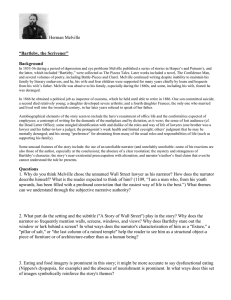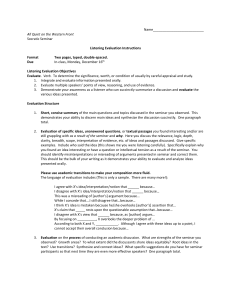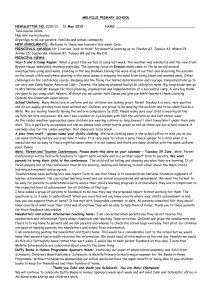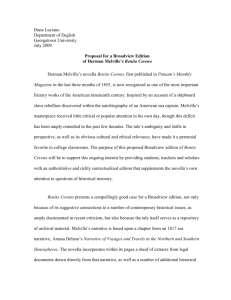Elizabeth Clark, History, Theory, Text: Historians and the Linguistic
advertisement
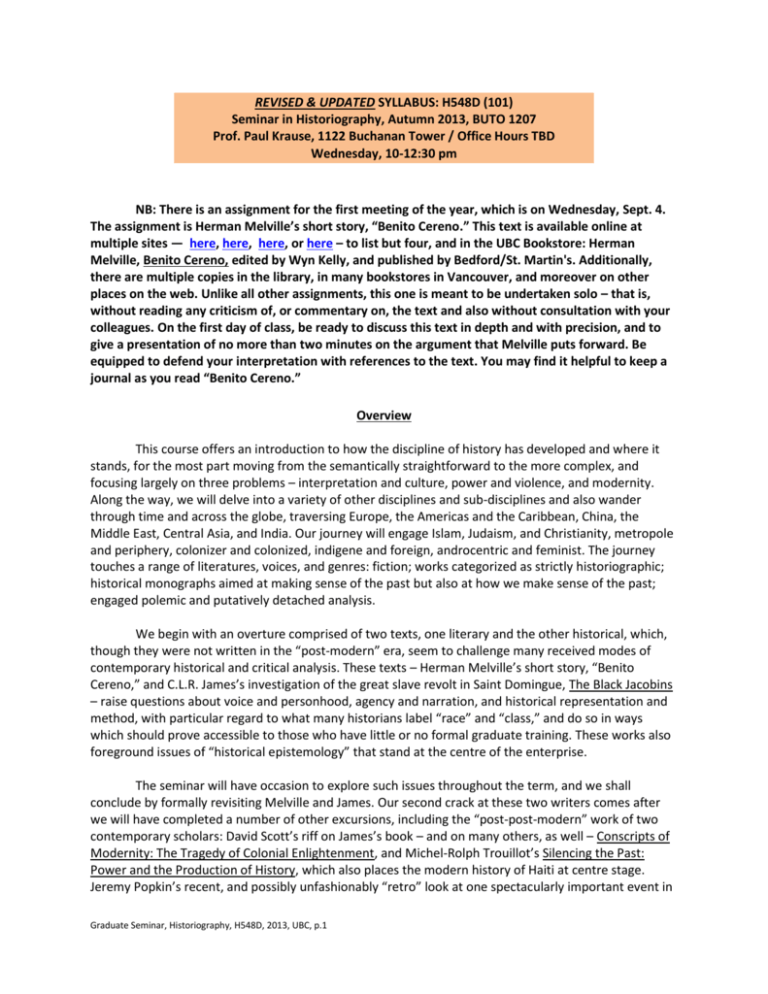
REVISED & UPDATED SYLLABUS: H548D (101) Seminar in Historiography, Autumn 2013, BUTO 1207 Prof. Paul Krause, 1122 Buchanan Tower / Office Hours TBD Wednesday, 10-12:30 pm NB: There is an assignment for the first meeting of the year, which is on Wednesday, Sept. 4. The assignment is Herman Melville’s short story, “Benito Cereno.” This text is available online at multiple sites — here, here, here, or here – to list but four, and in the UBC Bookstore: Herman Melville, Benito Cereno, edited by Wyn Kelly, and published by Bedford/St. Martin's. Additionally, there are multiple copies in the library, in many bookstores in Vancouver, and moreover on other places on the web. Unlike all other assignments, this one is meant to be undertaken solo – that is, without reading any criticism of, or commentary on, the text and also without consultation with your colleagues. On the first day of class, be ready to discuss this text in depth and with precision, and to give a presentation of no more than two minutes on the argument that Melville puts forward. Be equipped to defend your interpretation with references to the text. You may find it helpful to keep a journal as you read “Benito Cereno.” Overview This course offers an introduction to how the discipline of history has developed and where it stands, for the most part moving from the semantically straightforward to the more complex, and focusing largely on three problems – interpretation and culture, power and violence, and modernity. Along the way, we will delve into a variety of other disciplines and sub-disciplines and also wander through time and across the globe, traversing Europe, the Americas and the Caribbean, China, the Middle East, Central Asia, and India. Our journey will engage Islam, Judaism, and Christianity, metropole and periphery, colonizer and colonized, indigene and foreign, androcentric and feminist. The journey touches a range of literatures, voices, and genres: fiction; works categorized as strictly historiographic; historical monographs aimed at making sense of the past but also at how we make sense of the past; engaged polemic and putatively detached analysis. We begin with an overture comprised of two texts, one literary and the other historical, which, though they were not written in the “post-modern” era, seem to challenge many received modes of contemporary historical and critical analysis. These texts – Herman Melville’s short story, “Benito Cereno,” and C.L.R. James’s investigation of the great slave revolt in Saint Domingue, The Black Jacobins – raise questions about voice and personhood, agency and narration, and historical representation and method, with particular regard to what many historians label “race” and “class,” and do so in ways which should prove accessible to those who have little or no formal graduate training. These works also foreground issues of “historical epistemology” that stand at the centre of the enterprise. The seminar will have occasion to explore such issues throughout the term, and we shall conclude by formally revisiting Melville and James. Our second crack at these two writers comes after we will have completed a number of other excursions, including the “post-post-modern” work of two contemporary scholars: David Scott’s riff on James’s book – and on many others, as well – Conscripts of Modernity: The Tragedy of Colonial Enlightenment, and Michel-Rolph Trouillot’s Silencing the Past: Power and the Production of History, which also places the modern history of Haiti at centre stage. Jeremy Popkin’s recent, and possibly unfashionably “retro” look at one spectacularly important event in Graduate Seminar, Historiography, H548D, 2013, UBC, p.1 Haiti’s slave revolt, ‘You Are All Free:’ The Haitian Revolution and the Abolition of Slavery, provides one of two alternate finales to the course. How and why, as we shall see, is a question that goes to the heart of the arguments informing H548D. Scott, Trouillot, and Popkin offer penetrating commentaries on many post-modern writers, and put forward arguments about how to do history in a scholarly era rife with theoretical confusion and opacity. Where Melville and James serve up critiques of the modern world and its understandings of itself, Scott and Trouillot urge scholars to step beyond reductivist post-modernity and facile rejections of the possibilities for informed, meaningful scholarship. Popkin, for his part, argues more from example, but his work nonetheless engages the large question of modernity and its links to freedom and slavery, to civilization and barbarism, to power and insurgency, and to the notion of historical causality itself. Just how to do worthwhile, defensible history stands as the largest question that H548D poses, and we will begin to address it well before we get to the challenging work of Scott and Popkin at the end of the term. In fact, we directly and systematically confront the question immediately after our initial encounters with Melville and James, when in our third session we read Silencing the Past, which in recent years has become a favorite, if not a kind of Urtext, for many UBC graduate students, faculty members, and undergraduates. Elizabeth Clark’s, History, Theory, Text: Historians and the Linguistic Turn, extends Trouillot in certain ways and explores some vexing epistemological problems. With Clark, which can serve as a kind of crib sheet or program guide to post-modernism, with all its quirks and vagaries, we conclude the introductory module of the course. In sessions five and six we then consider more carefully positivism and its legacies, including Marxism. In subsequent weeks we engage the work, among others, of: the anthropologist Clifford Geertz and the problems of the interpretation of culture; the philosophers Paul Ricoeur and Charles Taylor, who wrestle more systematically with the problem of interpretation; the cultural historian Alain Corbin, who unearths (or creates) some surprising truths about the murder of a nobleman in an isolated French village in 1870; Tim Brook, who weaves global economic, art, and Chinese history into a compelling narrative that conflates micro and macro, personal and social, and West and East; David Nirenberg, who investigates minority persecution in the European Middle Ages, thereby interrogating contemporary and possibly more tragic cases of the constitutive other – cases which are explored near the end of the term in the scholarship of Edward Said and Timothy Snyder; the historian Richard White, who explores the emerging world of shared meanings and practices shaped by indigenes and Europeans alike in the Great Lakes Region, 1650-1815; Leo Tolstoy, “Хаджи-Мурат” (“Hadji Murat/d”), which also considers empire and resistance in a region whose contemporary history may inform our fate for decades to come; Judith Bennett, who seeks to open up the discipline to questions raised by feminist scholarship; and, finally Dipesh Chakrabarty, who, in exploring subaltern and post-colonial history on the Indian sub-continent, offers a compelling critique of modernity, reintroduces some of the problems encountered at the very beginning of the course in Melville and James, and sets up the final two sessions. For them, we will read Scott and Popkin, and/or Snyder, whose recent book, Bloodlands: Europe Between Hitler and Stalin, presents a magisterial, and magisterially disturbing, account of the most modern of wars in the most civilized of worlds. In so doing, Snyder interrogates, like Richard White, a “borderlands” region where history is informed by high-stakes geo-political maneuvers, ethnic violence, contests between putative barbarisms and putative civilizations, and genocidal or quasi-genocidal death. For those interested in comparative history, and in the problem of analytic categories, White and Snyder Graduate Seminar, Historiography, H548D, 2013, UBC, p.2 invite weighty concluding questions. Active engagement in the seminar is expected, and there will be opportunities for students to lead the discussions. Peer review of some of the shorter written assignments, which will be explained in detail at our first meeting, also will be offered. There will be a final, synthetic essay assigned later in the term; it will be due during the exam period. Throughout, careful attention must be paid to the texts we read; it is these readings which will inform our meetings – meant to be seminar discussions, not radio call-in shows, and meant to keep potentially interesting associations to other texts at some distance from centre stage. Additionally, we may organize small writing workshops for the seminar. This matter will be discussed at our first and second meetings in September. The breakdown for calculating term marks will approximate the following chart: Short critical essays of no more than four pages; no more than three assignments per term. Brief oral and written commentaries on these papers by your peers. The quality of your contributions to our discussions. Such contributions may include brief presentations as well as the give-and-take of normal seminar exchange. A final paper of no more than 15 pages. You will receive some suggestions for questions, but you also will be able to frame your own questions, in consultation with the instructor. 25% 15% 20% 40% Please be advised that plagiarism in any form cannot be tolerated and that, if it should occur, no energy will be spared to enforce the rules and regulations of the Department of History and of the university, as well as the statutes and legal codes of the Province of British Columbia. Please familiarize yourselves with such rules, etc. We will be talking about this issue for a brief time at our first and/or second session. Calendar Note that, for some weeks, not all of the readings will be required for all members of the seminar. We will make selections and emendations according to our interests and needs. As things always seem to get a bit rushed toward the end of the term, we may want to schedule an additional meeting early in the exam period. For this, we may convene at the instructor’s home – which will allow for a festive conclusion to our travails. Session One, Sept. 4 – Organization of & Expectations for H548D / Ways of Seeing: Post-Modernity Avant La Lettre, 1 – The Enlightenment Project & Modernity from the Belly of the 19th-Century Beast Herman Melville, “Benito Cereno.” Unlike all other assignments, this one is meant to be undertaken solo – that is, without reading any criticism of the text and without consultation with your colleagues. Please Graduate Seminar, Historiography, H548D, 2013, UBC, p.3 be certain to read Melville’s story for our first meeting, and follow the full instructions for the session that may be found at the beginning of this syllabus. Session Two, Sept. 11 – Post-Modernism Avant La Lettre, 2: From the Belly of the 20th-Century Beast C.L.R. James, The Black Jacobins (1938, with later changes). SEPT 18 – NO CLASSES / TRUTH & RECONCILIATION COMMISSION This means that we will be obligated to schedule a makeup session early in the exam period. Session Three, Sept. 25 – What is History, 1? (And What is Post-Modernism, anyway?) – An Anthropologist On How History “Works” Michel-Rolph Trouillot, Silencing the Past: Power and the Production of History (1995). Session Four, Oct. 2 – What is History, 2? Problems of Epistemology, Method, & Criteria of Judgment and Evaluation Elizabeth Clark, History, Theory, Text: Historians and the Linguistic Turn (2004). Session Five, Oct. 9 – The Positivist Tradition & Its Critics: Overviews, Critiques, Appreciations Readings by Peter Novick, Carl L. Becker, Richard J. Evans, R.G. Collingwood, Wulf Kansteiner (“Mad History Disease Contained? Postmodern Excess Management Advice from the UK,” review of Evans’s In Defense of History, History and Theory v. 39, No. 2. [May, 2000], pp. 218-2290); Joyce Appleby et al, Telling the Truth About History; Dominick LaCapra, on the interpretation of texts. Session Six, Oct. 16 – Positivism With a Twist (of Power and Causality): Marx & Marxism – and Some of Their Problems Karl Marx, “The 18th Brumaire of Louis Bonaparte;” LaCapra on “The Eighteenth Brumaire;” Jackson Lears and Raymond Williams on hegemony; and additional readings from Thomas Wartenberg and Walter Adamson. Session Seven, Oct. 23 – History, Anthropology, & the Problems of Culture and Interpretation in the ‘Periphery’ and ‘Core’ Readings from Clifford Geertz, Charles Taylor, Raymond Williams, and William Sewell; Paul Ricoeur, “The Model of the Text: Meaningful Action Considered as a Text,” New Literary History 5 (Autumn 1973): 91117; E.P. Thompson on “Time, Work-Discipline and Industrial Capitalism.” Session Eight, Oct. 30 – History, Anthropology, & the Problem of Culture, Violence, & Modernity in the Metropole Alain Corbin, The Village of Cannibals: Rage and Murder in France, 1870 (Harvard University Press; Reprint edition, 2006); David Nirenberg, Communities of Violence: Persecution of Minorities in the Middle Ages (1996). Session Nine, Nov. 6 – Metropole and/or ‘Semi-Peripheral’ Meets the ‘Peripheral,’ Local Meets Global, History Meets Anthropology – and, in Imperial Russia, History Meets Fiction Richard White, The Middle Ground: Indians, Empires, and Republics in the Great Lakes Region, 16501815, and Leo Tolstoy, “Хаджи-Мурат” (“Hadji Murat/d”) OR Tim Brook, Vermeer's Hat: The Seventeenth Century and the Dawn of the Global World (2008). Graduate Seminar, Historiography, H548D, 2013, UBC, p.4 Session Ten, Nov. 13 – Gender, Body, Identity, & Power: Feminist Historiography & the Problem of Analytic Categories Judith Bennett, History Matters: Patriarchy and the Challenge of Feminism; David Halperin, “Forgetting Foucault: Acts Identities, and the History of Sexuality,” Representations 63 (Summer, 1998): 93-120. Also of interest is his “Is There a History of Sexuality?” History and Theory 28 (Oct. 1989): 257-74. Session Eleven, Nov. 20 – Postcolonial and Subaltern History: Trying to Put it All Together, 1 Edward Said, Orientalism, selections; Dipesh Chakrabarty on “postcoloniality;” Arif Dirlik, “Chinese History and the Question of Orientalism,” History and Theory 35, no. 4 (1996): 96-118; "Reversals, Ironies, Hegemonies: Notes on the Contemporary Historiography of Modern China," Modern China 22, no. 3 (1996): 243-84, and “Postmodernism and Chinese History,” Boundary 2 28:3 (2001):19-60. Also of interest: Immanuel Wallerstein, on China, Marxism and the World System, in Timothy Brook and Gregory Blue, eds., China and Historical Capitalism: Genealogies of Sinological Knowledge (1999). Arif Dirlik, who may be visiting with us in the spring, has just published an intriguing piece, “Thinking Modernity Historically: Is “Alternative Modernity” the Answer?” Asian Review of World Histories 1:1 (January 2013), 5-44, which also may be assigned for this or for the subsequent session. Session Twelve, Nov. 27 – Post-Post-Modernity: Trying to Put it All Together, 2 (Narrative Possibilities and Challenges in a Post-Positivist, Post-Constructivist Era) David Scott, Conscripts of Modernity; The Black Jacobins and “Benito Cereno” redux. Session Thirteen, Dec. 2 (?) / TBD – Post-Post-Modernity: Trying to Put it All Together, 3 (“Gimme that Ol’ Time Religion?”) Jeremy D. Popkin, ‘You Are All Free’ and A Concise History of the Haitian Revolution OR Timothy Snyder, Bloodlands. What appears real and objective from TV or the newspaper is the result … of choices, of constructions, of a great deal of hiding of other realities. Walter Benjamin says every document of civilization is also a document of barbarism. What we see as real immediately is only a fraction of the truth. It is the role of the intellect not just to amass expert information, but much more basically, to question and, yes, to challenge the framework of knowledge – to ask about the hidden costs or barbarism, to ask for whom is this knowledge useful and why is it set up this way, for whom does this objective news, as it's sometimes called, serve as a reality, for what end, ethical or unethical, is a war declared, a missile deployed, a distant people punished, and so on. The greatest danger to the educated mind is that it should be made silent or stilled in its restlessness, its volatility, its need to ask provocative questions that challenge authority…. Most of what is presented as reality is the result of constructions and representations that I believe have to be looked at as having a history which is very often either forgotten, or hidden or distorted. — Edward Said, Commencement Remarks, Haverford College, 2000 Graduate Seminar, Historiography, H548D, 2013, UBC, p.5
